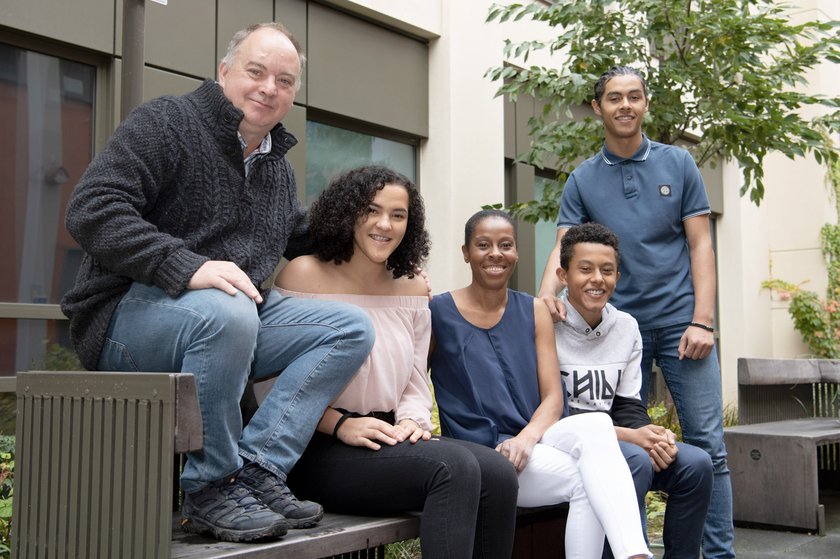Ocean is one of many diabetic patients taking part in ground breaking research and care at Addenbrooke's, to help find ways of preventing the condition.
Ocean was six years old when she was diagnosed with type 1 diabetes. A super-sporty football fanatic, she and her family had to learn how to monitor her blood sugar levels and carbohydrate intake 24 hours a day.
But even with plenty of training, and a glucagon injection kit for emergency management of low blood sugar levels, ten years later Ocean’s little brother found her lying unconscious on the bedroom floor.
Type 1 diabetes can be fatal if left untreated, and the constant monitoring and interventions needed are an ever-present worry for families. For the young people themselves it can result in serious complications, and impact self-esteem, friendships and achievements, if not carefully controlled.

But one day, all this could be different.
Dr Emile Hendriks leads a team at Cambridge University Hospitals Trust (CUH), hoping to find ways of preventing type 1 diabetes.
“We are already exploring how to detect children at risk of developing this very serious disease much earlier.
"I expect that in five years’ time we will be running trials to find treatments that build on our early detection findings and have the potential to prevent type 1 diabetes entirely.”
If I was being very optimistic, I would say that in 10 years’ time we may be looking at ways to prevent type 1 diabetes altogether.
Dr Emile Hendriks, Chief Investigator, INNODIA
Each year more than 3000 children are diagnosed with type 1 diabetes in the UK.
While genetics and environmental factors are thought to play a role, much is still unknown as to why. But it happens when the immune system attacks the pancreas, meaning it cannot produce sufficient insulin to control blood sugar levels.
At CUH, doctors split their time between looking after young people with type 1 diabetes, and working as scientists at the University of Cambridge looking for new treatments – inspired and informed by their experience of caring for children and their families day after day.
Hendriks is chief investigator for a project named INNODIA which is looking into the natural history and early detection of type 1 diabetes.
His team start monitoring newly diagnosed patients in the first six weeks following diagnosis to understand what happens in the body around this time, with the aim of spotting the disease earlier in future.
First-degree family members are given a blood test to look for antibodies. As the illness is an auto-immune disease, monitoring the levels of particular antibodies in the blood can signal imminent or likely onset.
“At the moment this is only a warning function, so we can make patients aware they are moving towards developing diabetes,” says Hendriks. “Though it does help to avoid going into diabetic ketoacidosis, a life threatening condition that arises if diabetes is left untreated”.
“But going forwards, early identification could move people into trials which seek to prevent the development of type 1 diabetes. That is the dream.”
Our hope is finding effective preventative treatments to begin when the child is an infant or toddler, because we know that autoimmunity often occurs during the first or second year of life
Dr Loredana Marcovecchio, Global Platform for the Prevention of Autoimmune Diabetes (GPPAD)
Another study, GPPAD (Global Platform for the Prevention of Autoimmune Diabetes), is being run by colleague Dr Loredana Marcovecchio.
Her work identifies babies who are at increased genetic risk of developing type 1 diabetes and giving them treatments to train the immune system to prevent it from derailing and attacking the pancreas.
“Newborn screenings, using specific new genetic tests, make it possible to early identify those infants at risk of developing diabetes. We hope that in future, early screening together with new potential treatments."

The work being done by Hendriks and Marcovecchio is typical of the early intervention and prevention work that will take place in the new Cambridge Children’s Hospital, combining extensive specialist clinical experience with world-leading research.
The new hospital, a partnership between CUH, the University, and mental health provider Cambridgeshire and Peterborough NHS Foundation Trust, will care for the whole child, integrating mental and physical health under one roof, in recognition of the interconnectivity of the mind and body.
Nowhere is this more evident than in the care of children with diabetes.
Until the golden grail of prevention is achieved, CUH has whole teams of diabetes experts who are dedicated to providing holistic care for youngsters – ensuring that schools are set up to support the child, training families and patients in managing the illness, designing remote treatment solutions that minimally interfere with normal childhood.

It is an approach that has worked for Ocean.
Fitted with a closed-loop insulin system by her doctors at CUH, she was able to play for Stevenage Borough girl’s football team, and represented England at the Dallas International Girls Football Cup in Texas, USA in April 2019.
Ocean also played volleyball for the England under 17’s team in the North European Volleyball Championships, where the team finished second - the highest ever finish for an England team.
“Nothing can stop her” says her father, Quinton.
I feel like she’s a great role model for younger kids with type one diabetes. Be the best you can be. She hasn’t let anything stop her, she’s truly inspirational.
Quinton, Ocean's father

